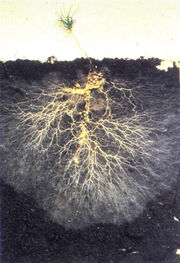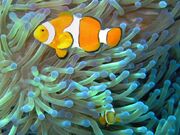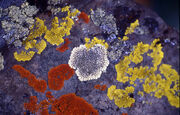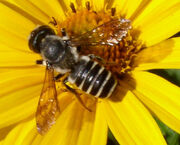No edit summary |
No edit summary |
||
| Line 1: | Line 1: | ||
| − | ==When organisms evolve together based on mutualistic relationships. |
+ | ==When organisms evolve together based on mutualistic relationships. The organisms both benefit from their interaction with one another. They may rely on each other for things like nutrients or protection.== |
| + | "Natural selection cannot possibly produce any modification in a species exclusively for the good of another species" (Darwin, ''On the Origin of Species)- ''Here Darwin argues that altruism between species doesn't exist, that instead, natural selection will produce modifications that can benefit another species while also benefitting the original species. |
||
| + | ==<span style="font-size:13px;">Symbiotic mutualism: </span><span style="font-size:13px;">When two different species are involved with one another for the bulk of their life span (Futuyma, 2005). </span>== |
||
[[File:Symbiosis Mutualism, Commensalism, and Parasitism-0|thumb|right|335 px]] |
[[File:Symbiosis Mutualism, Commensalism, and Parasitism-0|thumb|right|335 px]] |
||
==Examples: == |
==Examples: == |
||
| + | Mycorrhizal fungi and plants- while this relationship can be considered mutualistic when soil is infertile, it can be parasitic and reduce plant growth when soil is fertile (Futuyma, 2005). |
||
| − | Mycorrhizal fungi and plants |
||
[[File:Mycorrhizal-fungi2.jpg|thumb|mycorrhizal fungi]] |
[[File:Mycorrhizal-fungi2.jpg|thumb|mycorrhizal fungi]] |
||
| Line 14: | Line 16: | ||
Bee & Flower [http://bio4esobil2011.wordpress.com/2012/05/27/mutualism/ http://bio4esobil2011.wordpress.com/2012/05/2] |
Bee & Flower [http://bio4esobil2011.wordpress.com/2012/05/27/mutualism/ http://bio4esobil2011.wordpress.com/2012/05/2] |
||
| − | [http://bio4esobil2011.wordpress.com/2012/05/27/mutualism/ 7/mutualism/] |
+ | [http://bio4esobil2011.wordpress.com/2012/05/27/mutualism/ 7/mutualism/] |
| + | <p class="MsoNormal" style="margin-left:.5in;text-indent:-.5in;line-height:150%"><span style="font-size:12.0pt;line-height:150%;font-family:"TimesNewRoman","serif"">Darwin, C. (2003). ''On the Origin of Species: A Facsimile of the First Edition. ''Cambridge, MA: Harvard University Press. |
||
| + | </span></p> |
||
| + | <span style="font-size:12.0pt;line-height:115%; font-family:"TimesNewRoman","serif";mso-fareast-font-family:Calibri; mso-fareast-theme-font:minor-latin;mso-ansi-language:EN-US;mso-fareast-language: EN-US;mso-bidi-language:AR-SA">Futuyma, D. (2005). ''Evolution. ''Sunderland, MA: Sinauer Associates, Inc.</span> |
||
[[File:Clownfish_mutualism.jpg|thumb|left|Example: sea anemones and clownfish |
[[File:Clownfish_mutualism.jpg|thumb|left|Example: sea anemones and clownfish |
||
Latest revision as of 03:23, 2 December 2013
When organisms evolve together based on mutualistic relationships. The organisms both benefit from their interaction with one another. They may rely on each other for things like nutrients or protection.
"Natural selection cannot possibly produce any modification in a species exclusively for the good of another species" (Darwin, On the Origin of Species)- Here Darwin argues that altruism between species doesn't exist, that instead, natural selection will produce modifications that can benefit another species while also benefitting the original species.
Symbiotic mutualism: When two different species are involved with one another for the bulk of their life span (Futuyma, 2005).

Symbiosis Mutualism, Commensalism, and Parasitism-0
Examples:
Mycorrhizal fungi and plants- while this relationship can be considered mutualistic when soil is infertile, it can be parasitic and reduce plant growth when soil is fertile (Futuyma, 2005).

mycorrhizal fungi
Lichens
Clown fish & Sea anemone (http://bio4esobil2011.wordpress.com/2012/05/27/mutualism/)
Bee & Flower http://bio4esobil2011.wordpress.com/2012/05/2
Darwin, C. (2003). On the Origin of Species: A Facsimile of the First Edition. Cambridge, MA: Harvard University Press.
Futuyma, D. (2005). Evolution. Sunderland, MA: Sinauer Associates, Inc.

Example: sea anemones and clownfish The sea anemone protect clownfish from the predators ( The anemone has poison tentacles) and the clownfish protect anemones from fishes that eat anemones.

lichens

The flower gives food to he bee and the bee helps in the reproduction of the flower. ( The same function as the hummingbird)